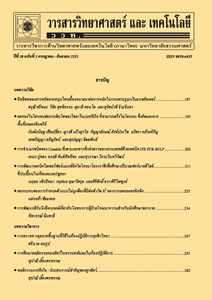เทคนิคทางพันธุศาสตร์เพื่อการวินิจฉัยและตรวจติดตามผลการรักษาโรคมะเร็งเม็ดเลือดขาวชนิดเรื้อรังแบบมัยอิลอยด์
Main Article Content
Abstract
บทคัดย่อ
โรคมะเร็งเม็ดเลือดขาวชนิดเรื้อรังแบบมัยอิลอยด์ (chronic myeloid leukemia, CML) เป็นโรคที่เกิดจากความผิดปกติของเซลล์ต้นกำเนิดเม็ดเลือด ทำให้ไม่สามารถสร้างเซลล์เม็ดเลือดชนิดต่าง ๆ เพื่อทำหน้าที่รักษาสมดุลของร่างกาย ความผิดปกติของโครโมโซมแบบ translocation ระหว่างโครโมโซมแท่งที่ 9 และ 22 (t(9;22)(q34;q11.2) ที่เรียกว่าโครโมโซมฟิลาเดลเฟีย ซึ่งสามารถตรวจพบมากกว่าร้อยละ 90 ของผู้ป่วย CML ความผิดปกติชนิดนี้ส่งผลให้เกิดยีนลูกผสมชนิด BCR-ABL ที่เป็นพยาธิกำเนิดของโรค ปัจจุบันการรักษาผู้ป่วย CML มีประสิทธิภาพมาก จากการใช้ยากลุ่ม tyrosine kinase inhibitors (TKIs) เช่น imatinib ซึ่งมีความจำเพาะต่อโปรตีนลูกผสม BCR-ABL ทำให้ยาออกฤทธิ์ต่อเซลล์มะเร็งเท่านั้น และเกิดผลข้างเคียงจากการใช้ยาน้อยมากเมื่อเปรียบเทียบกับวิธีรักษามะเร็งเม็ดเลือดขาวแบบอื่น แต่ปัจจุบันพบผู้ป่วย CML เกิดการดื้อต่อยา imatinib ได้ถึงร้อยละ 30 ซึ่งเกิดจากการกลายพันธุ์ของลำดับสารพันธุกรรมบริเวณที่เรียกว่า tyrosine kinase domain ของยีนลูกผสม BCR-ABL และเป็นสาเหตุสำคัญของการเกิดโรคกลับ (relapse) ในผู้ป่วย CML การตรวจทางห้องปฏิบัติการเพื่อตรวจหา Ph chromosome การตรวจติดตามระดับการแสดงออกของยีนลูกผสมชนิด BCR-ABL และการตรวจหาการกลายของยีน BCR-ABL บริเวณ tyrosine kinase domain มีความสำคัญเป็นอย่างยิ่งในการเพิ่มความถูกต้องแม่นยำในการวินิจฉัย การประเมินผลการรักษา และการวางแผนปรับเปลี่ยนวิธีการรักษาผู้ป่วย CML ในกรณีเกิดการดื้อยา บทความนี้กล่าวถึงการใช้เทคนิคทางพันธุศาสตร์แบบบูรณาการเพื่อวินิจฉัย ตรวจติดตามการรักษา และวิเคราะห์รูปแบบการกลายของยีน BCR-ABL ที่มีผลต่อการดื้อยาในผู้ป่วย CML
คำสำคัญ : เทคนิคทางพันธุศาสตร์; โรคมะเร็งเม็ดเลือดขาวชนิดเรื้อรังแบบมัยอิลอยด์; เซลล์ต้นกำเนิดเม็ดเลือด; การดื้อยา
Abstract
Chronic myeloid leukemia (CML) is a clonal haematopoietic stem cell disorder. The presence of Philadelphia chromosome or t(9;22)(q34.1;q11.2) resulting in the formation of BCR-ABL chimeric protein is recognized as the pathogenesis of the disease. Nowadays, the effective therapy of CML is based on tyrosine kinase inhibitors (TKIs) (e.g. imatinib) which have been improved the overall survival as well as quality of life of CML patients. However, approximately to 30 % of these patients become imatinib resistance and relapse regarding to the acquired mutations of BCR-ABL tyrosine kinase domain. Thus, standard and effective laboratory techniques for routine diagnosis, monitoring, and detection of BCR-ABL kinase domain mutations should be established to gain better benefits for CML patients. Here, we described the comprehensive genetic testing including complete cytogenetic study (karyotyping), fluorescent in situ hybridization (FISH), reverse transcription PCR (RT-PCR), quantitative RT-PCR (qRT-PCR), and direct sequencing for the detection of BCR-ABL mutations in routine diagnosis and monitoring of CML after treatment.
Keywords: molecular genetics; chronic myeloid leukemia; hematopoietic stem cell; imatinib; acquired mutation


